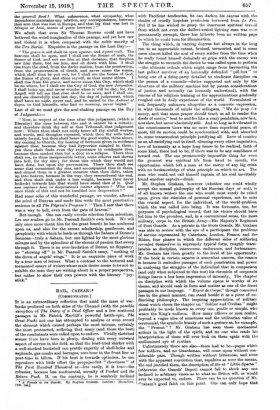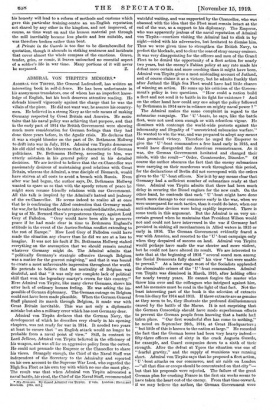HAIL, CAESAR I* [COMMUNICATED.]
IT is an extraordinary reflection that amid the mass of war- books produced on both sides of the Channel (with the possible exception of The Diary of a Dead Officer and a few scattered passages in Mr. Patrick MacGill's powerful battle-epio, The Great Push) not one has attempted to analyse or even record the element which caused perhaps the most intense, certainly • the most protracted, suffering that many (and those the best) of the combatants were called upon to endure. Vividly sketched scenes there have been in plenty, dealing with every outward aspect of service in the field, so that the least-tried shirker with a well-stocked bookshelf can prattle expertly of shell-holes and sapheads, gas-masks and barrages, zero-hour in the front line or post-time in billets. If his bent is towards optimism, he can reproduce with little effort the propagandist " cheeriness " of The First Hundred Thousand or—less easily, it is true—the robuster, because less sentimental, serenity of Pushed and the Beturn Push. If, on the contrary, he is sombrely inclined • A Private in As Quanta. By Stephan Graham. Leaden: Macmillan. 1/08. nat.) with Pacificist tendencies, he can darken his canvas with the shades of cruelly hopeless pessimism borrowed from Le Feu. But if he has wished to grasp the innermost spiritual travail from which not even the dullest-souled fighting man was ever permanently exempt, there has hitherto been no written page to which he could turn for illumination.
The thing which, in varying degrees but always in the long run to an appreciable extent, bruised, tormented, and in some cases almost killed the soul of every soldier from the time when he really found himself definitely at grips -with the enemy was the struggle to reconcile the duties he was called upon to perform —the ultimate ordeals which might range from bayoneting the last gallant survivor of an heroically defended " pill-box " to being one of a firing-party detailed to vindicate discipline on the person of a connsde—duties supported not only by the structure of the military machine but by patent considerations of justice and necessity (as humanly understood), with the canons of his religious training or the approximations gradually roughed out in daily experience of the world. Formulated or not, frequently unknown altogether as a concrete expression, in what thousands of minds the syllogism, "We do pray fcr mercy, and that same prayer should teach us all to render the deeds of mercy," beat to and fro like a crazy pendulum, now fast, now slow, but never absolutely still. And so long as it vibrated in the consciousness there was no more than superficial peace, at most, till its motion could be synchronized with, and absorbed in, some transcendent principle justifying all. Love of country as an all-satisfying end in itself, silencing every other imperative, love of humanity as a hope long hence to be realized, faith of some kind, there had to be, if there was to be any semblance of inward rest. The one permanently impossible thing for even the grossest was spiritual life from hand to mouth, the opportunism which left a man at the mercy of any big crisis with no foreknowledge of what principle on which to apt. The man who could not call himself captain of his soul inevitably found another captain—drink.
Mr. Stephen Graham, however (whether one could wholly accept the nomad philosophy of his Russian days or not), is of all known writers the one who could most surely be relied upon, given the stimulus of personal experience, not to miss this crucial aspect, for the individual, of the world-problem which the war called into being. It was fortunate, too, for purposes of psychological record, that Ids choice should have led him to the proudest, and, in a conventional sense, the most military, corps in the British Army—His Majesty's Regiment of Foot Guards. As a private in the &rote Guards, Mr. Graham was able to review with the eye of a participant the problems of service represented by Caterham, London, France, and the Rhine, four phases in which the different sides of soldiering revealed themselves in supremely typical form, roughly trans- latable as discipline, intercourse, endurance, and forbearance. Mr. Graham has risen greatly to the level of his opportunity. If the book in certain aspects is somewhat uneven, the reason is because it embodies passages of such penetration and power in analysing the struggles of the individual that in comparison (and only when subjected to this teat) his chronicle of corporate doings leaves a less keen impression of intensity., The chapter on discipline with which the volume opens is worthy of its theme, and should rank in form and matter as one of the finest passages in our language. "Esprit de Corps," though conceived lees in the grand manner, can stand beside it as a piece of un- flinching philosophy. The inspiring appreciation of military ritual which closes the chapter on "Soldier and Civilian" might profitably be made known to every one, gentle or simple, who wears the King's uniform. How many officers or men realize, beyond a vague ides of smartness and the utilitarian value of ceremonial, the symbolic beauty of suoh a gesture as, for example, the " Present " ? Mr. Graham has seen these meahanioal actions in the light of the spirit, and no one who reeds his interpretation of them will ever look on them again with the twill:mined eye of routine.
Unfortunately there are also—there had to be—pages which few soldiers, and no Guardsman, will come upon without con- siderable pain. Though written without bitterness, and even with the apparent conviction that, repulsive as were the means, the end justified them, the description of life at "Little Sparta" (otherwise the Guards' Depot) cannot fail to shock any one Inclined to arbitrary views as to what no Briton will, or would ever be expected to, endure. There can be no question of Mr. iirsham's good faith on this point. One can only hope that
his honesty will lead to a reform of methods and customs which gave this particular training-centre an un-English reputation not shared by any other in the kingdom, and not improved, of course, as time went on and the human material put through the mill inevitably became less plastic and less suitable, and was therefore broken rather than bent.
A Private in the Guards is too fine to be disembowelled for quotation, though it abounds in striking sentences and incidents that cover almost the whole compass of the emotions. Grave, tender, grim, or comic, it leaves untouched no essential aspect of a soldier's life in war time. Many portions of it will never







































 Previous page
Previous page